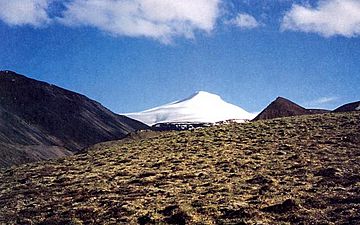Mount Gordon facts for kids
Quick facts for kids Mount Gordon |
|
|---|---|

Mount Gordon
|
|
| Highest point | |
| Elevation | 2,755 m (9,039 ft) |
| Prominence | 625 m (2,051 ft) |
| Listing | List of volcanoes in the United States of America |
| Geography | |
| Location | Valdez-Cordova Census Area, Alaska, United States |
| Parent range | Wrangell Mountains |
| Geology | |
| Age of rock | Holocene |
| Mountain type | Cinder cone |
Mount Gordon is a special type of volcano called a cinder cone. It is found in the Wrangell Mountains in eastern Alaska, United States. This mountain sits between a large ice river called the Nabesna Glacier and another big volcano, Mount Drum.
Mount Gordon is the tallest and most noticeable among many smaller cinder cones in the area. These smaller cones are usually less than 100 meters (about 328 feet) tall. Scientists believe these volcanoes formed during the Pleistocene and Holocene periods, which are recent times in Earth's history. However, no one knows exactly how old Mount Gordon itself is.
Contents
What is a Cinder Cone?
A cinder cone is the simplest type of volcano. It is shaped like a cone or a hill, usually with a bowl-shaped crater at the top. These volcanoes are built from bits of lava that are shot into the air during an eruption.
How Cinder Cones Form
- When a volcano erupts, hot, bubbly lava bursts out.
- As this lava flies through the air, it cools quickly and breaks into small, rocky pieces. These pieces are called "cinders" or "scoria."
- The cinders fall back down around the volcanic vent (the opening where the lava comes out).
- Over time, these cinders pile up, creating the cone shape of the volcano.
- Cinder cones often erupt only once. After that, the volcano becomes quiet.
Features of Cinder Cones
- They are usually much smaller than other types of volcanoes, like stratovolcanoes.
- Their slopes are quite steep, often around 30 to 40 degrees.
- The rock that makes them up is often dark and full of holes, like a sponge.
Mount Gordon's Location
Mount Gordon is part of the Wrangell Mountains, a large mountain range in Alaska. This area is known for its many volcanoes and glaciers. Alaska is a state in the United States, famous for its wild and beautiful landscapes.
The Wrangell Mountains
- The Wrangell Mountains are home to some of the largest volcanoes in North America.
- Many of these volcanoes are covered in ice and snow, forming huge glaciers.
- The area is protected as part of the Wrangell-St. Elias National Park and Preserve, the largest national park in the United States.
Glaciers and Volcanoes
Mount Gordon is located near the Nabesna Glacier. Glaciers are massive rivers of ice that move very slowly. In places like Alaska, volcanoes and glaciers often exist side-by-side. Sometimes, volcanic eruptions can even melt parts of glaciers, creating floods.
Age of Mount Gordon
Scientists classify Mount Gordon as a Holocene volcano. The Holocene Epoch is the current geological time period, which started about 11,700 years ago. This means Mount Gordon is a relatively young volcano, even if its exact age isn't known.
Studying Volcano Ages
- Scientists use different methods to figure out how old volcanoes are.
- They might study the layers of ash and lava, or use special dating techniques on the rocks.
- Knowing a volcano's age helps us understand its history and how active it might be in the future.
 | Kyle Baker |
 | Joseph Yoakum |
 | Laura Wheeler Waring |
 | Henry Ossawa Tanner |

